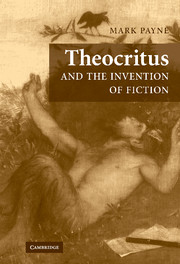Introduction: In the realms of the unreal
Published online by Cambridge University Press: 22 September 2009
Summary
No, shepherd, nothing doing.
The studies of Theocritus' bucolic poems in this book have grown out of the mixture of puzzlement and curiosity that I felt when I first read them. On the one hand, they seemed to me to lack the pointed vigor of expression that I admired in Greek lyric and tragic poetry. On the other, they were devoid of the attractions of plot and character that make rereading Homer so rewarding. I tried to map the appeal that I nonetheless felt in them onto that of the later pastoral tradition. But here again I found that, despite the resonant names of the later literature – Lycidas, Comatas, Damoetas – their allure did not reside in the kind of verbal magic that attracted me there. In the plainness of their poetic language, they read more like William Carlos Williams than the Eclogues, or L'après-midi d'un faune. What began to occur to me as a result was that the appeal of the poems did not in fact consist in any of the traditional resources of lyric and narrative poetry but in something rather less concrete, and more difficult to place, which I here call the world of the poems. By this I mean a complex of elements that embraces the physical characteristics of the places the herdsmen inhabit, their nature and behavior as fictional characters, and the positioning of them and their fictional world in relation to the reality of the reader.
- Type
- Chapter
- Information
- Theocritus and the Invention of Fiction , pp. 1 - 23Publisher: Cambridge University PressPrint publication year: 2007



